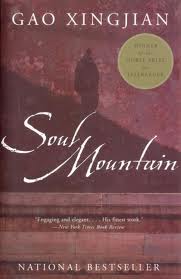“You’ve slapped together travel notes, moralistic ramblings, feelings, notes, jottings, untheoretical discussions, unfable-like fables, copied out some folk songs, added some legend-like nonsense of your own invention, and are calling it fiction!”
GAO XINGJIAN (SOUL MOUNTAIN)
 This is how Xingjian described his own novel: as a part of the novel. In the 72nd chapter of the book when an argument is broken out in between his conscious self and his dream-like projection of himself: this is how things transpire to him. And perhaps this is the place from where we should start to recount his novel as it is the lowest possible point of the estimation.
This is how Xingjian described his own novel: as a part of the novel. In the 72nd chapter of the book when an argument is broken out in between his conscious self and his dream-like projection of himself: this is how things transpire to him. And perhaps this is the place from where we should start to recount his novel as it is the lowest possible point of the estimation.
Gao Xingjian is a maverick. He takes his tale to the furthest corner imaginable especially for someone who is weaving a tale sitting in the Eastern corner of the world, almost forgotten, despised, ridiculed. And here lies his strength: in the collective assault of rejection that he had received. It is what enables him to walk away, to be the insurgent for individuality in a land under a regime where individual never existed. Being the part of a tradition somewhat similar to his, I often share or dare to share the agony of his lost soul.
Soul Mountain, the magnum opus novel of his creation, is the triumphant journey of an individual through the soul of a country trying hard to catch up to the world, to the illusion of progress and prosperity and in that effort obliterating its own history and tradition. The novel takes shape as a story told by an unnamed traveler while on his journey to the mysterious soul mountain or Lingshan. The author uses alternative pronouns as I and you at first in alternate chapters to follow two different narrative arks, evidently following the same person and same journey only in different stages of their journey. It obviously reminded me of his autobiographical work “One man’s bible” where almost through the entire book he used the pronouns You and He in alternate chapters. But later other pronouns are introduced; unlike One man’s bible, here, the story arks get muddled more and more; the dreamscape like scenes intervene into the mundane of the travelogue in a way that the boundary between fiction and memory and imagination does not remain clear. A ‘She’ is emanated from the acute loneliness and lust of the central character and yet she departs on a whim unnerving the story-teller as well as the readers, cultivating more doubt regarding her existence.
If we try to read the novel in an earnestly literal way, initially what it speaks of is a semi-autobiographical tale of a Beijing based writer who had a near-death experience in the form of being misdiagnosed to have terminal lung cancer. After he was informed off his not being in danger, he sets out for a journey through the mountains of Sezwan province of China, partially to evade the Communist authority hunting him as a righting element needed to be ‘cured’ by reform through labour and partially out of his yearning for the past of his nation that he never encountered, that remained hidden for his generation for years past. While on his way, he encounters that history of the traditionally sumptuous nation through mythologies and folk-lores, through religious traditions of Buddhist and Daoist (Taoist), through the simple unaggravated lives of the people living at the fringe of the modernity, through a journey towards his own past, to search the grave of his long-forgotten grand-mother. The linear story ark is lost after a while as both the writer and the reader loses interest in keeping account of the day to day realism. The reader enmeshed in stories and anecdotes told through carefree yet captivating manner remains true to the writer till the final page of the long novel.
In a way, Gao Xinjian’s novel is not afflicted by the absurdism as is expected from the “Beckett of the East”. Rather he concentrates on revealing an obscure history of what the world know very little. In that sense he can be paralleled to Orhan Pamuk.
Unlike Pamuk or Murakami, he is not impaired with the choice between two world: eastern or western. Rather Gao’s world is a world torn apart by different projection of self, a world very private and very universal at the same time. Sitting in a part of the world where the annihilation of self is mandatory both politically and traditionally, Gao’s endeavour to embrace his kaleidoscopic self image is not only laudable; it also transpires us to a world we seldom experience.
Pingback: #14 Accept the Forgiveness of Others | 101 Lessons In Positive Psychology